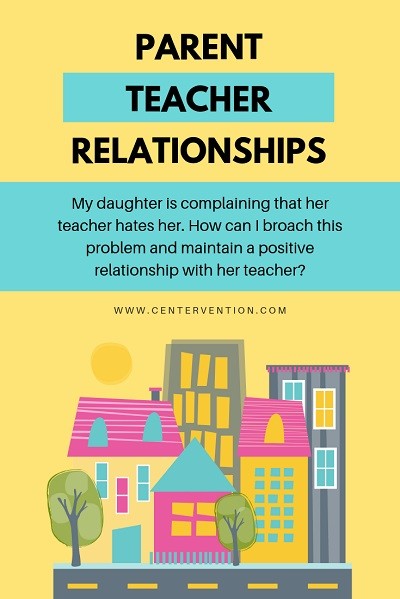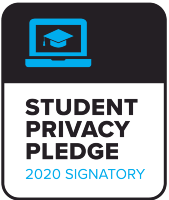
Q: My daughter’s teacher seems like a lovely woman and, so far, we’ve had a good parent-teacher relationship. But now my daughter is complaining that her teacher hates her, that she never calls on her in class and that she clearly has a favorite student. How can I broach this problem with my daughter’s teacher and still maintain a positive parent-teacher relationship with her?
Establishing productive parent-teacher relationships can be tricky
Disagreements between teachers and students can be tricky for parents to navigate. On the one hand, parents want their child to be happy and thriving at school and may be quick to cry foul when their son or daughter raises concerns. On the other hand, they’re armed with only one side of the story—their child’s.
Phyllis Fagell, school counselor, therapist and author of “Middle School Matters,” has these words of wisdom for parents: Don’t go into the school angry.
“You want it to be a partnership first and foremost,” Fagell said of the parent-teacher relationship. “This should be a collaborative relationship. Go in knowing and assuming that the teacher is on your child’s side and rooting for them and wants exactly what you want, which is for your child to have a positive, enriched, learning-focused, happy school experience.”
Research shows that positive parent-teacher relationships can be an important part of a child’s education. In fact, one study from the University of Missouri found that a teacher’s impressions of parents’ engagement in their child’s academic life can help or hurt their achievement.
“If a teacher has a good relationship with a student’s parents or perceives that those parents are positively engaged in their child’s education, that teacher may be more likely to give extra attention or go the extra mile for that student,” said Keith Herman, a professor at Missouri’s College of Education, in an article about the study. “If the same teacher perceives another child’s parents to be uninvolved or to have a negative influence on the child’s education, it likely will affect how the teacher interacts with both the child and the parent.”
The key, of course, is to maintain a constructive parent-teacher relationship throughout the school year. To do that, Fagell shares these tips.
Clue them in
If their child believes there is a problem, it’s important to let the teacher know because it’s a sign that they need to work on the relationship with the child, Fagell said.
Still, if a child is complaining about a teacher’s alleged bad behavior, remember this: Your child may not be good at interpreting feedback. They may be overly negative. Or, they could just be reading things incorrectly, Fagell said. Maybe the “teacher’s pet” has some special needs that require more attention.
When issues arise, Fagell recommends saying something like this: “We recognize that this is their perception and perception isn’t necessarily reality. We want you to know this because it’s interfering with our ability to feel positive about school. We don’t think you’re targeting or neglecting our child in any way.”
If you are accusatory, the teacher’s defense will go up and you won’t get far, she said. The better approach is to be collaborative and curious and to treat the teacher as a professional.
Share the at-home issues
Does your child struggle with depression or anxiety? Are you getting divorced or moving? Is there an illness in the family, a job loss or other financial strain? Let the teacher know.
“All of these things leak into the classroom in myriad ways,” Fagell said. “The more open the parents are and the family is with teachers, the more likely they are to be patient and work on some problem-solving.”
Listen when the teacher raises concerns
If a teacher suspects a learning issue, take it seriously, Fagell said. Gather all the parties together—teachers, school psychologists, counselors, administrators—to find out what they’re seeing during the school day.
At the same time, she said, parents can share when the child is most likely to get frustrated and what kind of language they’ll be most responsive to. Just because a teacher identifies a potential problem doesn’t mean they’re right, but it’s worth hearing them out, Fagell said.
Remember to praise
Often, parents are silent until something goes wrong. Don’t be that parent, Fagell said.
“It’s always nice to send a note to acknowledge that something is going well,” she said. “Part of that parent-teacher partnership is don’t just wait until there is a catastrophe. That relationship is ongoing, so acknowledge the times that you are really impressed with that dynamic and what’s going on in the classroom.”
Stay involved
“If there are opportunities to volunteer, you’re going to have a better window into your child’s experience. And if the teacher is sending home blogs, photos of the class, read them and talk about them with your child.”
Phyllis Fagell, School counselor, therapist and author of “Middle School Matters”
Give them some space
“This is one of the first relationships with an adult your child may have outside the family unit. If you take a back seat and let the relationship develop without much interference, a special bond may develop.”
Linda Lendman, School Counselor
Mind your manners
“A teacher (or school) might have a policy you find frustrating, even maddening. Truly unfair policies require parents to advocate for their child. However, there’s a gap between annoying and unjust. Matters of preference are probably not worth fighting. A teacher needs the latitude to do his job the way he feels is best. That includes the freedom to set his own policies. If you must challenge something, start privately. Be polite; you can always escalate if needed.”
Braden Bell, Author and teacher
